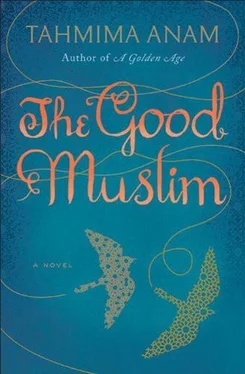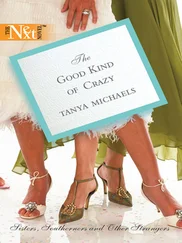‘Never mind about that. Is he here?’
The boy released the handle of his bucket. ‘No, he’s gone. Did you see the French ladies?’ he said.
‘Yes, I did.’
‘Last month we had the Russian jamaat. I can talk in Russian.’
‘What can you say?’
He fired off a few foreign-sounding words.
‘What does it mean?’
‘Peace,’ he said, bending his knees and jumping high, ‘peace shanti peace. I know it in Spanish too.’ And he uttered another string of gibberish.
‘Do you have a book?’
He landed on his heels, rocked back and forth. ‘No books. Only my head,’ he said, pointing a finger at his temple.
‘I have to go now,’ Maya said.
‘Goodbye. Khoda Hafez. Au revoir!’ he called out. The French women must have been here before. He reached into his pocket and pulled out a flattened samosa. ‘For you,’ he said.
‘No, you have it. I’m not hungry.’
He bit off one end of the triangle. ‘Okay, ta-ta-bye-bye.’
Ammoo was in the kitchen. The servant Rehana had hired a few years ago was standing over the sink, washing the pots from last night’s dinner.
‘Maya, this is Sufia.’ Taller than Maya by at least six inches, the woman came close, smiled and placed a large hand on her shoulder.
‘I know all about you,’ Sufia said. She looked her up and down. Maya saw her thinking, so this is the daughter who won’t come home. Looks like a peasant. Cheap salwaar-kameez, not even starched. Long hair, yes, but what skin, burned all dark by the sun. She kept smiling and patting her heavily.
‘I was running,’ Maya said. ‘I went to the graveyard.’
Ammoo nodded. Then she came close and put her hand on Maya’s cheek. ‘I am so happy.’
Maya was happy too. The warmth of it spread through her. She wanted to say it, to tell her mother she was home now, that she was staying put, but she couldn’t. It wouldn’t be true. When Ammoo took the samosas out of the frying pan, she remembered Nazia’s children, how they would save up their Eid money and buy samosas in town, sharing one, arguing over who had been given the bigger half.
‘Where is Sohail?’
‘He came to see me this morning,’ Ammoo said. ‘He asked me to tell you he sends his love.’
Love? Was that the word he had used? ‘Did he say when he’s coming back?’
‘Not for a few weeks.’
Sufia began to grind turmeric with a giant stone shaped like a rolling pin. She passed the stone back and forth over the turmeric bulb, smashing it into a rough paste, and then went over it again and again until it turned smooth, darkening to the colour of crushed marigolds. ‘Always coming and going,’ she said, scooping the turmeric on to a plate and starting the whole process again with a handful of garlic. ‘Coming and going.’
‘It’s like the United Nations up there. They weren’t even speaking Bangla.’
‘They come from all over the world,’ Ammoo said, pouring more oil into her pan.
‘Because of Sohail and Silvi?’
‘That’s what they do — they go from country to country, like missionaries.’
As a boy Sohail had attended a Jesuit school called St Gregory’s. Maya had visited him once on Games Day. The priests were dressed in long linen gowns with strings tied around their waists. An egg-and-spoon race. These were the images that came to mind when Ammoo said missionaries, not the cinnamon-scented women upstairs.
Ammoo lifted something out of the frying pan. ‘You want a samosa?’
The thought came rushing into Maya’s mind. Grey eyes. About the right age. ‘Was that Sohail’s son I just saw upstairs?’
‘If he was carrying a bucket, that’s the one,’ Sufia said, turning now to a pile of lavender-skinned onions.
‘But he looks. . Ammoo, did you see him?’
Ammoo put down her spatula and gathered the samosas on to a plate. ‘Yes, beta, I know. I was going to talk to you about it this morning.’
‘And?’
‘And’, Sufia interjected, ‘there’s nothing to be done. Boy runs around like a ruffian; that’s how they want it.’
‘Doesn’t he go to school?’
‘Sometimes they read the Book with him,’ Ammoo said.
‘And you just let them?’
Rehana passed the plate of samosas to Maya. Maya saw a great weariness in her mother’s gesture. She saw that, whatever was happening upstairs, Ammoo had decided to ignore it. She was no longer the protective, panicky mother she had once been. If Sohail wanted to burn his books, if he wanted to throw away his furniture and unscrew the light sockets and piss into a hole in the ground, so be it. Once she had given everything for her children. Now she was in retreat from them, passively accepting whatever it was they chose to do: turning to God, running away, refusing to send their children to school. There was nothing of the struggle left in her any more.
It was then Maya realised the years had been far, far longer for her mother.
‘He’s not my son,’ Ammoo said simply. ‘And he’s not yours. We do what we can, but you have to remember that.’
Maya remembered something else. The tree. She fetched it from Sohail’s room and presented it to her mother. ‘From Rajshahi,’ she said simply, knowing Ammoo would realise at once it was a prized mango tree, and that, if it survived the winter, it would yield the tart, complicated fruit that could be found nowhere else.
His name was Muhammad Zaid bin Haque. A long name for a small boy. The next day Maya kept her eye on the staircase, and as soon as she caught the shape of him she rushed outside and stood in his way. ‘Zaid, remember me?’
He shook his head, then, seeing her face fall, he said, ‘Ha ha, I fooled you!’
‘So you’re a joker and a linguist?’
‘What’s a linguist?’
‘Someone who knows a lot of languages. I know some languages too. How about I teach you a few things?’
He held up the bucket, empty. ‘I have to go,’ he said, running to the tap.
Later, he knocked on the door. ‘Do you want to play Ludo?’ he said, slipping off his sandals and stepping into her room.
‘Okay. You have a board?’
He unfolded a sheet of paper. On it, someone had attempted a crude reproduction of a Ludo board, the square boxes crisscrossing each other and filled in with a blue pencil.
Zaid produced a handful of stones. ‘White ones are yours,’ he said. ‘Black are mine.’
‘Where did you get this?’
‘My ammoo made it for me.’
‘Really?’ Maya said, wondering if he wanted to talk about his mother, dead less than a week now. ‘You played Ludo with her?’
He nodded vigorously. ‘Every day.’
He produced a single die. ‘You roll first,’ Maya said.
Six. ‘Chokka!’ he announced, moving his stone across the sheet.
‘Zaid,’ Maya said, rolling a three, ‘do you go to school?’
‘No,’ he said, blowing on the dice. ‘But I’m going.’
‘When?’
‘Next year. Ammoo promised.’
‘Do you know you have to wear a uniform to school?’
‘Pant-shirt?’
‘Yes, pant-shirt.’
He grinned. ‘I know.’
‘Your father might not allow it.’
He rolled a four. ‘I ate you!’
‘I think you skipped one.’
‘No, it was a four.’ He moved the stone back. ‘One-two-three-four. See?’
She was quite sure he had been five places behind. She let it go, losing to him quickly, and as soon as the game was over he folded the paper, tucked it under his arm, like a surveyor carrying his plans, and disappeared.
Zaid came and went. Maya sometimes found him squatting in the flowerbeds, picking insects out of the weeds. His Bangla was coarse, his consonants slurred. And his body was a mess. A rash that peppered his skin caused him to scratch and bleed. There was a line of small indentations on his forearm, dirt in every crease and ripple of him. He was six but looked about four, his wrists and ankles narrow, brittle. He wore identical, pale blue kurtas that were too small or too big, and a cap on his head, pushed back so that it circled his head like a crown.
Читать дальше












